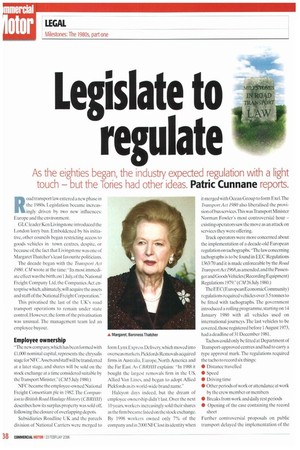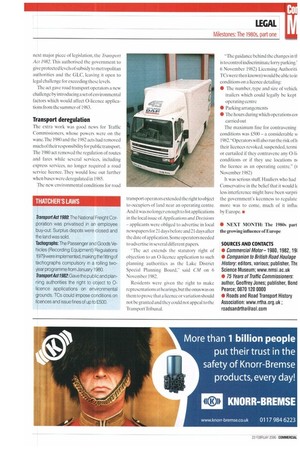Legislate to regulate
Page 38

Page 39

If you've noticed an error in this article please click here to report it so we can fix it.
As the eighties began, the industry expected regulation with a light
touch — but the Tories had other ideas. Patric Cunnane reports.
Road transport law entered a new phase in the 1980s. Legislation became increasingly driven by two new influences: Europe and the environment.
GLC leader Ken Livingstone introduced the London lorry ban. Emboldened by his initiative, other councils began restricting access to goods vehicles in town centres, despite, or because of the fact that Livingstone was one of MargaretThatcher's least favourite politicians.
The decade began with the Transport Act 1980. CM wrote at the time: "Its most immediate effect was the birth, on 1 July.of the National Freight Company Ltd, the Companies Act enterprise which, ultimately, will acquire the assets and staff of the National Freight Corporation."
This privatised the last of the UK's road transport operations to remain under state control. However, the form of the privatisation was unusual. The management team led an employee buyout.
Employee ownership I lb: hwcolnpany,whichhas been fonned with i1,000 nominal capital, represents the chrysalis stage for N FC. Assets and staff will be transferred at a later stage. and shares will he sold on the stock exchange at a time considered suitable by theTransFxm Minister:. (CM 5 July 1980.) NFC became the employee-owned National Freight Consortium plc in 1982. The Companion to British Road Haulage History (CBR1111 ) describes how its surplus property was sold off, following the closure of overlapping depots.
Subsidiaries Roadline UK and the parcels division of National Carriers were merged to form Lynx Express Delivery, which moved into overseas markets. Pick fords Removals acquired firms in Australia, Europe, North America and the Far East. As CBRHH explains: "In 1988 it bought the largest removals firm in the US, Allied Van Lines, and began to adopt Allied Pickfords as its world-wide brand name."
Halcyon days indeed, hut the dream of employee ownership didn't last. Over the next 1.0 years, workers increasingly sold their shares as the firm became listed on the stock exchange. By 1998 workers owned only 7% of the company and in 2000 NFC lost its identity when it merged with Ocean Group to form Exel.The Transport Act 1980 also liberalised the provision of bus services.This wasTransport Minister Norman Fowler's most controversial hour — existing operators saw the move as an attack on services they were offering.
Truck operators were more concerned about the implementation of a decade-old European regulation on tachographs. -The law concerning tachographs is to be found in EEC Regulations 1363/70 and it is made enforceable by the Road TransponAct 1968,as amended, and the Passenger and Goods Vehicles( Recording Equipment) Regulations 1979.(CM26 July 1980.) The EEC(European Economic Community) regulations required vehicles over 3.5 tonnes to be fitted with tachographs. The government introduced a rolling programme,starting on 14 January 1980 with all vehicles used on international journeys The last vehicles to be covered, those registered before 1 August 1973, had a deadline of 31 December 1981.
Tachos could only be fitted at Department of Transport-approved centres and had to carry a type approval mark . The regulations required the tacho to record six things: • Distance travelled • Speed • Driving time • Other periods of work or attendance at work by the crew member or members • Breaks from work and daily rest periods • Opening of the case containing the record sheet Further controversial proposals on public transport delayed the implementation of the next major piece of legislation, the Transport Act 1982. This authorised the government to give protected levels of subsidy to metropolitan authorities and the GLC. leaving it open to legal challenge for exceeding these levels.
The act gave road transport operators a new challenge by introducing a set of environmental factors which would affect 0-licence applications from the summer of 1983.
Transport deregulation The extra work was good news for Traffic Commissioners, whose powers were on the wane.Tbe 1980 and the 1982 acts had removed much of their responsibility for public transport. The 1980 act removed the regulation of routes and fares while several services, including express services, no longer required a road service licence. They would lose out further when buses were deregulated in 1985.
The new environmental conditions for road transport operators extended the right to object to occupiers of land near an operating centre. And it was no longer enough to list applications in the local issue of Applications and Decisions — applicants were obliged to advertise in local newspapers for 21 days before and 21 days after the date of application. Some operators needed to advertise in several different papers.
"The act extends the statutory right of objection to an 0-licence application to such planning authorities as the Lake District Special Planning Board," said CM on 6 November 1982.
Residents were given the right to make representations at hearings, but the onus was on them to prove that a licence or variation should not be granted and they could not appeal to the Transport Tribunal. "The guidance behind the changes in ti is to control indiscriminate lorry parking.' 6 November 1982) Licensing Authoriti, TCs were then known) would be able to in conditions on a licence detailing: • The number, type and size of vehick trailers which could legally be kept operating centre
I Parking arrangements • 'the hours during which operations COI carried out
The maximum fine for contravening conditions was £500 — a considerable sl 1982."Operators will also run the risk of h their licences revoked, suspended, tenni or curtailed if they contravene any 0-1i, conditions or if they use locations n1 the licence as an operating centre." (I November 1982) It was serious stuff. Hauliers who had Conservative in the belief that it would k less interference might have been surpri: the government's keenness to regulate more was to come, much of it influt by Europe.
• NEXT MONTH: The 1980s part the growing influence of Europe




























































































































































































